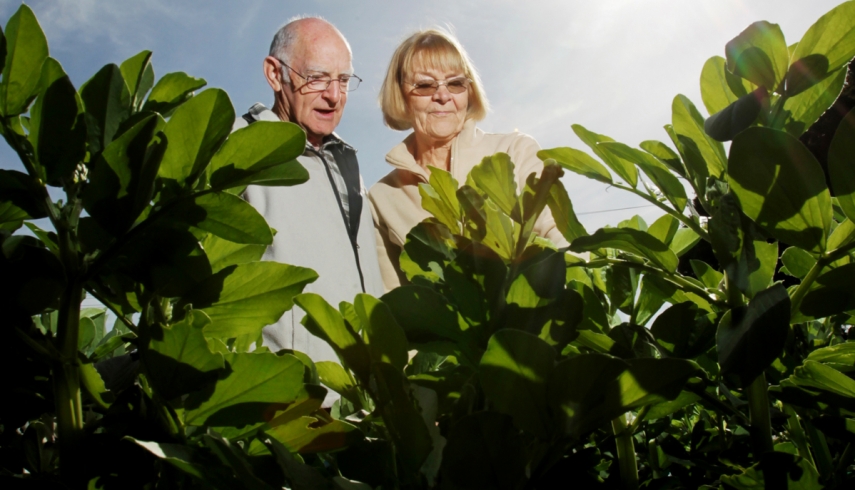Locked kitchen doors … skipped meals … food for the children but nothing for mum. Australia may be one of the world’s wealthiest countries, but the cupboard is bare for thousands of struggling families. Benjamin Millar meets those who say they won’t stop until there is food on the table for all.
IN a cavernous Yarraville warehouse, workers sporting ‘hi-vis’ vests scurry about like ants readying their nest for a particularly brutal winter. It could be any food distribution operation but for one aspect: nothing is charged for the tonnes of food going out the door every day.
One by one, vans from charities across Melbourne drive up to waiting pallets inside the Foodbank Victoria warehouse, loading up that day’s allocation.
The workers are mostly volunteers and the food has either been donated to Foodbank Victoria or manufactured to order for feeding those in need.
CEO Ric Benjamin says Foodbank has grown from providing around 1 million kilograms of food in 2004 to more than five million kilograms last year.
“We’ve been growing in excess of 20 per cent year on year in terms of the amount of food we’re providing. We estimate there’s another 5 million kilograms of food we should be getting to people. We think the need is around 10 million kilograms a year, which is a huge amount.”
Benjamin says the food saves families in distress about $35million a year, freeing up funds for other essentials such as shelter, clothing and electricity.
Across in Kensington, SecondBite plays its own part in rescuing food that would otherwise be dumped.
Chief executive Elaine Montegriffo says the organisation’s aim is to take a bite out of the $7 billion worth of food Australians dump into landfill every year.
SecondBite organises for leftover food from corporate events, restaurants, supermarkets and markets to get to where it’s needed most.
Montegriffo says it’s no easy feat, but the wheels are kept turning by more than 500 volunteers pitching in nationwide.
“There is no way we could do what we do without our volunteers.”
Demand has risen every year as more families struggle to make ends meet.
Montegriffo says the cost of feeding a family in Australia has escalated by 40 per cent in the past decade.
“Yet at the same time you have all this perfectly edible food being thrown out because it doesn’t look perfect. That’s where we step in – rescuing this fresh food and providing it for free.”
Catered and corporate events were once a source of massive food waste. Mass-prepared fresh food would find its way to landfill faster than a Melbourne Cup winner taking take the home straight at Flemington.
But thanks to partnerships with venues and clubs across Melbourne, SecondBite can make sure untouched food ends up where it’s appreciated.
The focus is on nutrition — not just any food, but the right food to keep people healthy.
Montegriffo says more than 75 per cent of the food provided by Second Bite is fresh fruit and vegetables.
“We have a really strong focus on improving nutrition. It’s not just about providing sustenance but looking at making sure people such as new arrivals and low-income families are receiving nutritious food in their diet.”
A Doutta Galla Community Health Service report released in August describes ‘food insecurity’ as inconsistent access to safe, nutritionally sound, culturally acceptable foods from non-emergency sources.
Vic Health says marginalised communities, including the unemployed, low-income earners and renters, are four times more likely than the general population to experience food insecurity (20 per cent versus 5 per cent).
Growing food insecurity has prompted the federal government to develop Australia’s first-ever national food plan to reduce barriers to a safe and nutritious food supply.
Benjamin says an estimated 400,000 Victorians each year go hungry because they can’t afford food, adding that the wider community is often entirely unaware their neighbours may be going without.
“People don’t advertise the fact it’s happening,” he stresses. “You could be living next door to someone who has food handouts, but how would you know?”
He tells of one welfare agency visiting a home to kind a lock on the kitchen door.
“Here are parents who have to lock the door because they can’t afford to allow their kids to snack. That’s a pretty horrific thing.”
Benjamin says the welfare sector is under extra pressure as it gears up to help people who can no longer expect assistance from government.
‘‘The human condition is that if you have a problem you tend to deal with it yourself,’’ he says. ‘‘You will struggle with a mental illness or a disability. But eventually you might get to the point where you’ve been sleeping in the car for five days and you’ve got two kids on the back seat and you’ve run out of food, and that’s when you’ll turn for help — you’ll rip down a door to make sure your kids get fed.’’
As well as accepting donations of food, FoodBank is now working with manufacturers to produce staples such as pasta and rice, milk, tinned food, and sauces.
Mr Benjamin says about $6 million in funding would enable Foodbank to produce $60 million in food — “sufficient to provide those staples to everyone in need around Australia”.
Other initiatives include a breakfast club program to get children off to the right start for the day. The ‘club’ now operates at 50 schools; the target is 400.
The Urban Street Harvest program being trialled in Maribyrnong invites backyard gardeners to donate their excess fruit and vegetable crops.
“The program is very exciting because it’s about community engagement,” says Benjamin. “It’s about food, it’s about linking people into a sense that they can support other people in the community, but doing so in a non-threatening way.”
Sometimes it can all seem too much for any one person to help. Like the child told to eat their spinach with thoughts of the starving in Africa, there seems to be a disconnection between our own habits and the prospect of
feeding the hungry. But Maidstone couple Karin and Stan Dickson believe there’s plenty we can all do.
They’re putting their green thumbs to work in a Sunshine garden plot that is set to become a source of fresh fruit and vegetables for vulnerable Brimbank residents.
Homeless people, families in need and clients of the Salvation Army’s Sunshine Youth Housing project will receive 80 per cent of produce grown at the Sunshine Community Garden on Devonshire Road.
Karin Dickson says she and Stan, keen gardeners, have been busy weeding, planting and watering a mix of vegetables.
“We’re really keen to be helping the aged, people who can’t afford to feed their families. It’s great knowing we can help this way.”
The couple didn’t want to see out retirement indoors, opting to stay active and give back
to the community with a project they could be proud of.
“We are working out how we can keep providing for people and keep it sustainable,’’ Mrs Dickson says. ‘‘Everything should be ready to go in the new year.”
She says encouraging the next generation of green thumbs is also high on the agenda.
“It’s a learning program as well. A big part of the project is teaching the students from nearby schools about things like propagating seeds. The hope is the students will then encourage their families to grow healthy food at home.”
Like FoodBank, SecondBite has been expanding every year. One of its recent achievements is establishing a direct delivery model, linking community welfare agencies directly with businesses in regional areas that might otherwise fall through the net.
“Our overall aim in the long term is for us not to be needed,’’ says Montegriffo.
‘‘We want to see families and people not going hungry in Australia. There is more than enough food for everyone, we just need to make sure it gets where it needs to be.”







